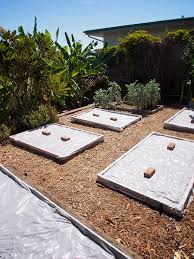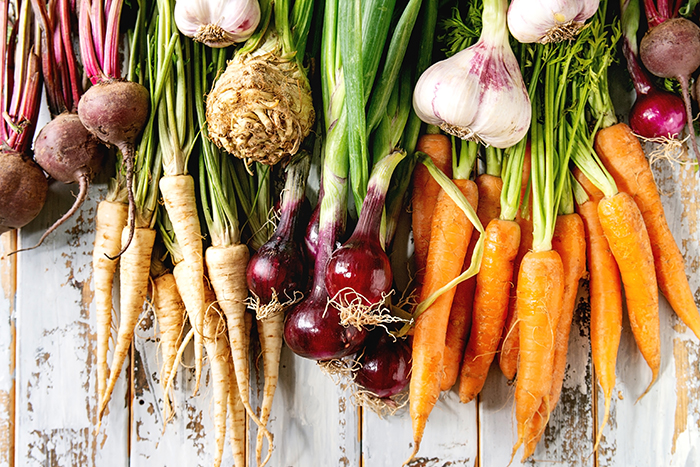Growing and maintaining a vegetable garden through the summer this far south in Florida has always been a challenge, even for the most seasoned Floridian.
New full time residents are almost always at a loss in trying to figure it out. Heavy rains or periods of no rain at all, soil borne plant diseases, nematodes, countless summer insects, relentless heat and constant humidity are just a few of the obstacles we face as we choose to keep growing our own food through the long and often difficult days of summer. That explains why so many food gardeners just put their veggie gardens to bed this time of year and wait for fall to arrive.
Solarize Your Garden Plot
Solarization means that you literally allow the sun to cook the soil to a point where weed seeds, harmful bacteria, diseases and soil dwelling insect eggs and larvae cannot survive.
- Cover moist soil with thick clear plastic and sealing the edges so no heat escapes.
- Leave on for 6-8 weeks during the hottest part of the year. The temperature of the soil when covered can reach 150 degrees in the top 2″-3″ and up to 100 degrees as deep as 18″, thus reducing the populations of these pests, as very few organism can survive those kind of temperatures over an extended period of time. Earthworms simply go deeper to escape the heat. Beneficial organisms like Mycorrhizae and other fungal and bacterial microbes are still present but at depths below the intense heat level.
- When the plastic is removed in early fall, it’s time to re-plant.

Our seasonal residents have an advantage over us in that they can grow tomatoes all summer long in Ohio and grow them here all winter in Florida. But for the more adventurous or perhaps just stubborn Florida gardener, there are just a few food crops that do well in the FL summer. Okra, peppers, eggplant, Lima beans, even cherry tomatoes and a variety of melons can be successfully grown practically year-round here. But I sure do miss my fresh spinach and leafy greens.
The Florida Legislature recently passed a bill that bans local governments from regulating food gardens. This means that you can now grow your own food crops in your front yard if you want. The bill also overrides any previous local ordinances that ban such gardening practices. How this applies to deed restricted communities and condo associations I don’t know, I’m sure there will be challenges. But it’s clear that food gardening is making a come back in a big way. Our parents and grandparents grew their own vegetables mostly out of necessity either for financial reasons or lack of availability. I remember helping my Dad with his garden year after year. His thing was Turnips (YUCK). I liked the greens, the roots not so much, and he grew 1/4 acre of the stuff. Every year! What I didn’t appreciate at the time was the pure pride I saw on his face when it was finally time to dig those Turnips. He’d go all over town passing them out. It did seem like in later years all the neighbors went out of town for a month at the end of Turnip season. Subsequently we ate a lot of Turnips. Took me 40 years to finally come to terms with Turnip root. It’s not really that bad, pretty good actually. Who knew? ##recipe?
I believe in my heart that we all want fresh produce and we all want it to be chemical free and safe to eat. We don’t want pesticide laden or genetically modified veggies; just real spinach, arugula and Romain lettuce. Unfortunately, there is really no way to know for sure where the produce you buy at the grocery store came from or how it was grown, processed and packaged. For these reasons home gardening is really the best way to ensure the quality of the food we eat.
Tilling the soil, planting the seed and watching nature’s magic work through you is an act of pure joy for most. There’s the watering, the feeding and of course the weeding! Unless you have a raised garden bed weeding requires bending and kneeling which I’m sure is getting as tough for you as it is for me anymore. Oh, the sacrifices we make for our little farms. But for the serious, get your hands in the dirt kinda gardener there is such a great sense of satisfaction when that first perfect tomato is finally ready to pick or you walk into the house with a huge handful of perfect organic strawberries. Oh it’s priceless.
So what to do if you live in a condo complex or have no available outdoor space to plant your little food farm? Well guess what, there is an alternative to traditional soil gardening and it can be done anywhere! Really anywhere and it’s simpler and easier than you could ever imagine. It’s called Aeroponics. Aeroponics is a way of growing fruits and vegetables without soil. Similar to hydroponics, aeroponics relies on circulating nutrient rich water over the surface of plant roots. The main difference between the two is that aeroponic gardens cycle between water and air. A timer allows the pump to run water over roots for a certain period of time and then briefly shuts off to allow those same roots some time to breathe. In reality plant roots really do not need soil to survive, they do however need water, nutrients and air. Soil is essentially a medium that holds water and nutrients for the plants to take up. An aeroponic system accomplishes this perfectly but without the mess.
I’m sure there are variations on how aeroponic systems are designed but I’m really only familiar with one. It’s a tower concept. Water is stored in a tank at the base of the tower and pumped to the top of the tower where is runs down the inside walls supplying water to plants placed in small cups inserted into the sides of the tower. The concept is so simple and the maintenance is beyond simple. These tower units can be set on a special dolly that allows them to be easily moved from one area to another as the seasons change. But the most impressive thing about aeroponics is that you can grow most fruits and vegetables including leafy greens year round. Yes, you heard me right, year round! Because the unit can be placed in an area where the greens get much needed direct morning sun but are slightly shaded during the intense heat of the day the greens will not burn. Also, the cycled water is cooler than typical garden soil in mid summer. Soil borne fungi and diseases are non existent when there is no soil as are nematodes and other soil pests. These systems have stacking sections that can be added at anytime so the height of the garden and the number of plants that can be grown at any given time is up to you. There are even grow lights available. You could literally grow organic veggies right in your kitchen. Absolutely does not get any fresher than that. These compact vertical gardens are the answer to limited space or deed restrictions. They can be used on a patio, lanai or porch. Indoors or out. They are so versatile. Condo associations could set up a bank of towers to provide fresh organic fruits and vegetables for the residents year round when a traditional garden would perhaps not be practical.
So here’s the gig: Our health and that of our families is dependent upon the foods we eat and the quality of those foods. Growing your own produce is no longer just for the serious gardener. There are alternative systems available that can fit any situation. I think we can all agree that home grown food will always be the best alternative to store bought produce for so many reasons and home gardens are the answer.The security in knowing where your food came from, knowing what’s in it and what’s not in it is comforting. Becky’s Garden Shoppe will be holding informational classes about the concept of aeroponic gardening on June 8th, June 15th and June 29th at 9:00 am. These are informal Q & A classes that run about an hour but you can come by any time to see first hand just how this amazing system works. Becky’s Garden Shoppe is open Tuesday -Saturday from 8:00-4:00.
Becky Copenhaver

